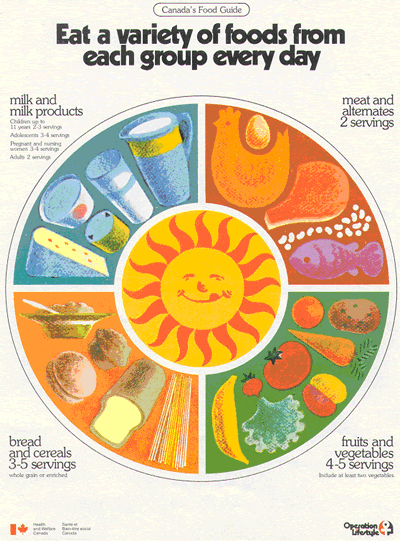Where's the LIVER?

While researching the Canadian Dietary Guidelines, I realized that up until the 1992 guidelines eating LIVER, specifically, was recommended on each and every guideline. The recommended amount was "once a week", "frequently", or as part of the 2 recommended servings of "protein" per day (1). So what happened to the liver recommendations after that? Where's the Liver now?
But who the heck eats LIVER? I bet you didn't know that liver is the most nutrient dense food, "pound for pound", in comparison to ANY other food, did you (2)? I didn't know either. I've always had liver, but I thought that, for us, it was "cultural", but I guess in Canada, it was "cultural" too, until 1992. Across the world, it is still "cultural" to eat liver, and in some places, even "chic". Ever heard of foie gras? It's duck or goose liver pâté that you can find in fancy French restaurants. Jewish delis also sell chopped chicken livers, and you can find chicken, duck and beef liver in other "cultural" specialty stores all over the place (3).
Why would anyone want to eat LIVER? Well, it seems it's not just people that eat liver. I also found out that when lions make their kill, and rip open their prey to start feasting, their "appetizer", the very first thing they eat, every time, are the organ meats (4). The organ meats, also known as the "offal" , include the liver, kidneys and heart of the animal (again, "culturally" we eat ALL of these). I guess it's not just cultural, it's actually INSTINCTIVE. So, liver has protein (obviously); Essential Fatty Acids (EPA, DHA and AA); all the B vitamins and folate; all the fat-soluble vitamins A, D, E, K; is rich in minerals such as iron, copper, zinc, chromium, copper, CoQ10; and a micronutrient called choline (to name a few, see full list below) (2, 3, 4, 5, 6, 7). Without getting into a whole nutrition lecture, since it has B12 (in large amounts), folate and iron, liver can prevent and treat all forms of anemia. Zinc, and many of these vitamins, are necessary for a proper immune function. Folate (folic acid) is important for fetal development. CoQ10 is key for muscle and heart health. EFA's are important for EVERYTHING. The fat-soluble vitamins alone prevent a million diseases, including depression, eye and heart diseases. The B vitamins, and folate again, deal with our neurological system. Chromium aids in blood sugar regulation. Lastly, choline is becoming increasingly more medically-interesting and seems to be mostly found in liver, eggs and breastmilk (the other two are pretty important foods, think maybe liver is too??). I could go on, but the key thing here, is not only that liver has ALL of these nutrients, it has them in higher amounts than most other foods, including fruits and vegetables!

Nature's Most Potent Superfood (2)
Why wouldn't EVERYONE want to eat liver? It appears that around 1992 something happened that made people not want to continue eating liver, right? Well, besides the fact that here, again, our guidelines seem to be causing more diseases than actually preventing them (more on this later...), I think this might also have something to do with the internet and the "information age". I actually had a hard time in my research finding anything negative against eating liver, but I found it. There’s the “old” cholesterol criticism, we all know cholesterol causes heart disease, right? WRONG! And also, as people started to “understand” more about how our body works, I guess they found out that the liver is our detoxifier, and somehow got “getting rid” of toxins mixed up with “storing toxins”. And so, people started saying that you shouldn’t eat liver because it is FULL of toxins. Where’s the logic here? Toxins are actually stored (when our elimination pathways aren’t working properly) in other places, the liver gets rid of them. The liver stores all these nutrients up there. While it is true that the best source of liver comes from pasture/grass-fed animals, this holds true for any other part of the animal, including the fat and muscles (the parts that we normally do still eat). Anyway, a valid caution: you can have too much of a good thing, some good things. Because liver stores vitamin A, this fat-soluble vitamin, important for many things including immunity and eye health, can be toxic at very high doses. Please tell me you are not gonna be that person that goes from not eating liver at all, to eating it everyday…
References
1. http://www.hc-sc.gc.ca/fn-an/food-guide-aliment/context/fg_history-histoire_ga-eng.php
2. http://chriskresser.com/natures-most-potent-superfood/
3. http://www.drweil.com/drw/u/QAA401116/Organ-Meats-Liver-Lover.html.
4. http://brigittefactor.com/be-like-a-lion-eat-liver/
5. http://articles.mercola.com/sites/articles/archive/2013/12/30/eating-organ-meats.aspx
6. http://www.livestrong.com/article/47245-beef-liver-nutrition-information/
7. http://www.drweil.com/drw/u/ART03240/Choline.html




















